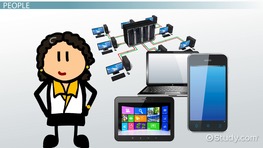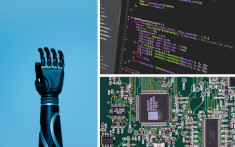Explore Computer Science
Computer Science Courses
Study.com offers many exciting computer science courses in several different fields. Students can get an introduction to computer science, computer theory, branches of computer science, and computer science fields.
Explore our full library of computer science courses:
Computer Science 102: Fundamentals of Information Technology
Computer Science 103: Computer Concepts & Applications
Computer Science 310: Current Trends in Computer Science & IT
Business 104: Information Systems and Computer Applications
Business 109: Intro to Computing
Explore our full library of computer science courses:
What is Computer Science?
Computer science refers to the study of computers as well as systems. Computer science careers can involve working with or developing the hardware and software on computers, or they can involve working in burgeoning fields like artificial intelligence. The range of what is possible in the future is near limitless.
In the past few decades, computers have gone from large, obtrusive machines to small enough to fit in one's pocket like a mobile phone or tablet. Today, children are introduced to mobile phones, tablets, and computers from the earliest ages, and many schools and businesses rely heavily on technology. Computer scientists are busy working to improve and develop tomorrow's technology.
Computer science includes topics such as artificial intelligence, computer engineering, computer programming, data science, computer networks, software, and cybersecurity. These topics are diverse and require specialized knowledge and skills. Computer science courses can help students understand all of the different aspects of computing while preparing them to be able to discuss them intelligibly.
No one knows what technology will have in store in the future. What is apparent is that the talented people of today must learn to work, build, and manage these systems to help people utilize them to the best of their abilities.





Computer Science Test Prep
Students can earn college credit for their computer science knowledge by using Study.com's TECEP Network Technology Study Guide. This guide covers computer science concepts such as protocols, infrastructure, mobility, cloud computing, and wiring. After reviewing these user-friendly study materials, students will be well prepared to succeed on the TECEP exam.
Computer Science Study, Career & Scholarship Resources
 |
Choosing to major in computer science offers students a broad range of specializations from hardware engineering and software programming to cloud computing and internetworking. No matter the direction you choose to go in, majoring in computer science is a great entry point to many fast growing - and well paying - careers. Read on below to find resources for funding your education, helping you study, and finding the corner of computer science that is the perfect fit for you.
Career Options for Computer Science Graduates
Computers and technology are embedded in so much of life now that a degree in computer science has become a very versatile option, with most being very well paid and in high demand. Here are a few traditional career choices as well as a few you may not have considered that range from the straightforward to the highly complex:
- Software Developer : Even this job title contains a plethora of career options, including programming computer applications and operating systems, creating web and mobile apps, developing websites, and even coding software for cars, appliances, and everything electronic.
- Hardware Technician: For those who like to work with the physical components of technology, there is no shortage in the demand for experts who can install, troubleshoot, repair, and upgrade systems. If making hardware and devices better and innovating new technologies is your thing, becoming a hardware engineer goes beyond computers to avionics, mobile technologies, gaming consoles, medical equipment, or IoT (Internet of Things) devices.
- Artificial Intelligence Engineer: AI is the future, and AI engineers innovate new technologies to make computers and systems "think" more like humans. This specialty is relevant in a wide range of industries, such as gaming, education, transportation, aviation, and medicine.
- Video Game Developer: Computer science majors with a creative streak could enjoy the best of both worlds by using their tech skills to develop and animate video games. In addition to the variety of gaming platforms - mobile apps, computer games, and the multitude of gaming consoles - video game developers can also create simulations for military, aviation, medical, and several other industries.
- IT Project Manager: Technology blends with business acumen in this profession. Computer science majors who excel in organizational, leadership, budgeting, and communication skills may find their niche in IT project planning for business growth, increased productivity, and information security.
- Web Developer: Another option that integrates creativity with technology, web development is a staple for any business, individual, or other entity that wants a web presence. The constant evolution of development tools, programming languages, and web functionality make websites limited only by your imagination. Some businesses employ their own creative departments with in-house web developers, but many developers also work for outsourcing companies or are self-employed.
- Computational Linguist: Blending software engineering, AI, and a love of language, computational linguists bridge the communication gap between humans and computers through natural language processing. These are the experts behind speech recognition, machine translation, and sentiment analysis (the ability of computers to understand such things as emotion or sarcasm).
- Database Developer: Companies, government agencies, schools, and nonprofit organizations have a digital ton of data that needs to be organized and accessible, yet secure. A database developer acts as an information architect, using tools like SQL queries and other complex indexing operations to create a functional and sustainable storage system for that data.